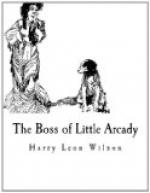“What is ’Dut’?” I asked severely.
“Dut is—is a Dut,” she answered, somewhat abashed by my want of enthusiasm.
“A Dut is a baddix—a regular baddix,” volunteered her brother. Following a device familiar to philologists, he submitted concrete examples.
“Two of those Sullivans are Duts, and so’s Mrs. Sullivan sometimes when she makes me split kindling and let the cat alone and—”
“That will do,” I said; “that’s enough of such talk. Come right into the house.”
“It ain’t a baddix to say ‘O Crackers!’” he observed tentatively, as he followed us.
“It may not be for some people,” I answered. “Nice people might say that once in a great while, on week-days, if they never said any other baddixes; but it’s just as bad as any of them if you say all the others—especially that horrible one—”
“Gamboge,” he reminded me, brightly.
“Never mind saying it again!”
Then came a new uproar from the wagon-box. We perceived that the train had moved off again, manned now entirely by Sullivans. They sought, I detected, to produce in our minds an impression that the thing was going better than ever. The toots of the Sullivan-throated whistle were louder and more frequent, and the voice of the largest could be plainly heard. He had combined the two offices of train-boy and conductor. We heard him alternately demanding “Tickets!” and urging “Peanuts, cakes, and candies!” If the intention had been to lure us back to witness a Sullivan triumph, it failed. We shut our lips tightly and moved around to the front porch.
The foiled Sullivans presently followed us here. They made a group at the base of a maple on the lawn and, affecting not to notice us, talked in a large, loud way so that we must overhear and be made envious,—even awe-struck; for they had all secured jobs on the real railroad, it appeared. They would have to begin to-morrow, probably. They didn’t know for sure, but they thought it would be to-morrow. It would be fine, riding off on the big train. Probably they would never come back to this town, but sleep on their big engine every night; and every day, from the toothsome dainties of the train-boy Sullivan’s basket, they would “eat all they could hold.” The elder Sullivan, aged eight, he of the artistic temperament, here soared dizzily into the farthest ether of romance. He had his uniform at home, at that very moment, and a cap with “gold reading” on it—it read “Conductor” on one side, and “Candy” on the other. Only—this veritably smacked of genius—the blue coat with the gold buttons had been made too small for him, and he’d have to wait until they sent him a larger size—“a No. 12,” he said, with a careless, unseeing glance at our group. This was a stroke that had nearly done for one of us—but a moment’s resistance and another of sober reflection saved him. He flashed to me a look of scorn for the clumsy fabrication.




